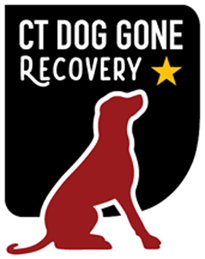Sometimes dog owners may do certain things that can inhibit their chances of finding their lost dog. By sharing these potentially problematic behaviors, CT Dog Gone Recovery Volunteers (DGR) hopes to educate dogs owners to avoid these behaviors if by chance their dog goes missing.
-
Occasionally, owners may take the approach of “wait and see” thinking their dog will come home on its own. While there is a chance the missing dog will return on its own, it is important to understand the first few hours when a dog goes missing is the best opportune time to be able to locate the dog, or to find someone who may have seen the dog.
-
Often owners and/or friends will search for their dog by yelling the dog’s name and try to catch them by chasing them. Many dogs become terrified and go into a “survival” mode when they go missing. This is especially true if they went missing because they were frightened by something. Therefore, when people yell out or call for their dog, or chase after a dog more often than not, will cause the dog to run in the other direction.
-
Many dog owners give up actively searching for their dog too quickly if the dog hasn’t been recovered in a short amount of time. They are discouraged and believe they will never see their dog again, that someone must have stolen their dog, the dog is miles and miles away, or that the dog is deceased. With these beliefs, they decide to stop the search all altogether.
-
Dog owners don’t know where to start when their pet goes missing, and many don’t put in the effort that it takes to recover a dog. Actively searching for a missing dog takes a lot of hours, and patience. Many owners just give up.
-
More often than not, lost dog owners don’t realize the importance of spreading the word that their dog is missing. Creating effective extra large brightly colored posters that are placed in strategic locations can significantly increase the chance of recovering lost dogs. DGR does NOT recommend using small flyers as posters. The majority of these flyers are not readable by the people who drive by them. More likely these flyers are ignored.
-
Occasionally, the dog owner or other concerned people will post sightings on Facebook. While knowing where there are sightings is extremely important in locating the missing dog, having the world also see where the dog has been sighted is not helpful. Many times people who think they are being “helpful” may flood the area looking for this missing dog, often calling out the name, unaware that they could actually be scaring the dog even more, and more than likely pushing the dog out of the area. DGR recommends the owner to tell everyone to share any sighting information directly to the owner or contact person and reframe from posting the dogs whereabouts on the internet.
-
Some people with missing dogs avoid walking door to door with flyers and talking with your neighbors can also increase the chance of recovering lost dogs. Talking with them makes it personal and often they want to help. Additionally, talking with neighbors the lost dog owner may discover someone has seen your dog, and they may not have thought more about it until they were asked about it.
